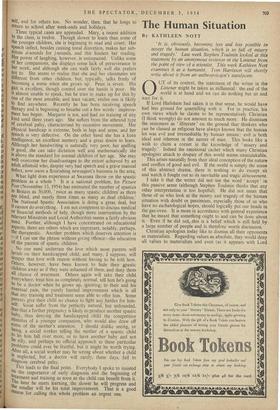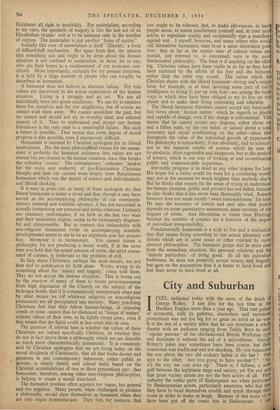The Human Situation
By KATHLEEN NOTT
'It is, obviously, becoming less and less possible to accept the human situation, which is so full of misery and tragedy.' Last week Stephen Toulmin looked at this statement by an anonymous reviewer in the Listener from the point of view of a scientist. This week Kathleen Nott examines it as a humanist. Toni Harrisson will shortly write about it from an anthropologist's standpoint.
0 UT of its context, the statement of the writer in the Listener might be taken as millennial: the end of the world is at hand and we can do nothing but sit and wait for it.
If Lord Hailsham had taken it in that sense, he would have had less ground for quarrelling with it. For in practice, his own views which he claims to be representatively Christian (I think wrongly) do not amount to much more. He dismisses the statement as ' illiterate' on the ground that' thinkers who can be classed as religious have always known that the human lot was evil and irremediable by human means: evil is both ideal and inherent in the nature of man. This looks like a wish to claim a corner in the knowledge of ' misery and tragedy.' Indeed the emotional cachet which many Christian apologists attach to despair of this world seems unmistakable.
This arises naturally from their ideal conception of the nature and conflict of good and evil. If the world is simply the scene of this abstract drama, there is nothing to do except sit and watch it fought out to its inevitable and tragic denouement.
I take it that the writer did not use the word ' accept' in this passive sense (although Stephen Toulmin thinks that any other interpretation is too hopeful). He did not mean that those of us who look at the misery and tragedy of the human situation with doubt or pessimism, especially those of us who have no eschatological hopes, should logically put our heads in the gas-oven. It is more in accordance with general experience that he meant that something ought to and can be done about it. Even if he did not, this is a belief which is still held by a large number of people and is therefore worth discussion.
Christian apologists today like to dismiss all their opponents as materialists. Regarding values as absolute, they would deny all values to materialists and even (as it appears with Lord
Hailsham) all right to sensibility. For materialists, according to his view, the spectacle of tragedy, is like the last act of an Elizabethan drama: evil is to be assessed only in the number of corpses. The materialist is just another lump of matter.'
Actually this view of materialism is itself illiterate,' a form of billiard-ball mechanism. But apart from that, the opinion that something can and ought to be done about the human situation is not confined to materialists, to those, let us say, who pin their hopes to a readjustment of our economic con- ditions. More importantly, certainly for my present purposes, it is held by a large number of people who can roughly be described as humanists.
A humanist does not believe in absolute values. For him values are discovered in the actual experiences of the human situation. Living is a struggle and an art. We are all individually born into given conditions. We can try to improve them for ourselves and for our neighbours, but of course we cannot wish them away. We cannot annihilate the past, but we cannot and should not try to worship ideal and selected aspects of it. Thus to understand and accept our human limitations is the only road to a meaningful future. But such a future is possible. That means that some degree of moral progress is also possible, even if enormously difficult.
Humanism is resented by Christian apologists for its liberal implications. But the main philosopifical reason for the resent- ment is probably the humanist insistence that values are not eternal but are created in the human situation, since that breaks the orthodox ' corner.' The contemporary orthodox ' hanker for the unity and authority of pre-Renaissance Christian thought and date our current woes largely from Renaissance humanism which was the matrix of science and individualistic and liberal thinking.
It is easy to point out, as many of these apologists do, that liberal humanism is under a cloud and that, though it may have served as the accompanying philosophy of our nineteenth- century material and scientific advance, it has not succeeded in actually humanising our personal and public relations. Certainly our planetary performance, if we look at the last two wars and their immediate origins, seems to be increasingly disgrace- ful and irresponsible. But to connect this indissolubly with non-religious humanism (with its accompanying scientific developments) seems to me to be an argument post hoc propter hoc. Moreover it is inconsistent. You cannot blame a philosophy for not producing a better world, if at the same time you hold that the actual amount of crime, the strict assess- ment of corpses, is irrelevant to the problem of evil.
In fact, many Christians, perhaps the most sincere, are not thus tied to justification by faith alone. Works, trying to do something about the misery and tragedy,' count with them. They do not accept the human situation. This is borne out by the reaction of many of them to recent pronouncements from high dignitaries of the Church on the subject. of the hydrogen bomb, that it is comparatively unimportant when and by what means we (of whatever religious or non-religious persuasion) are all precipitated into eternity. Many practising Christians feel that their fellow human-beings, of opposing creeds or none, cannot thus be dismissed as lumps of matter,' without values of their own, to be lightly swept away, even if that meant that the Spirit could at last come into its own.
The question of interest here is whether the values of these Christians are indeed specifically Christian, or whether they do not in fact derive from a philosophy which we can describe as much more characteristically humanistic. It is commonly said by Christian apologists that we are living today on the moral dividends of Christianity, that all that looks decent and generous in our contemporary behaviour, either public or private, is simply family and school habit based on the Christian accumulations of two or three generations ago: that humanism, therefore, among other non-religious philosophies,. is helping to create a moral dust-bowl.
The humanist position often appears too vague, too general and too negative. Many people, when challenged to produce you ought to be tolerant, Just, to make allowances, to km/ people alone, to resent interference yourself and, at your moss active, to repudiate cruelty and occasionally sign a manifest against war. I myself, however, and many others who woul call themselves humanists, start from a more theoretical pos tion: that as far as the rentier view of culture values an morals, just referred to, is concerned, ours is the mor fundamental philosophy. The boot is if anything on the othe leg. Christian values have been viable in so far as they havd been nurtured by the efforts of the free and the humane, rather than the other way round. The values which the Christian shares with the liberal humanist—loving one's neigh' bour, for example, or at least devoting some part of one's intelligence to trying to put up with him—are among the basin ways in which men have been obliged to try to live on this planet and to make their living interesting and tolerable. The liberal humanist therefore cannot accept any hard-and- .fast views about human nature' which he regards as plastid and capable of change, even if the change is infinitesimal. This means that he cannot accept any dogmas, either about sill and a fallen state, on the one hand, or indeed about a total economic and social conditioning on the other—since that disregards the value of the individual growth of experience. His philosophy is indissolubly, if not obviously, tied to science not to the material results of science which he sees ad by-products, often regrettable and dangerous, but to the method of science, which is our way of looking at and co-ordinating public and communicable experience. Inevitable progress is as dead as any other dogma for him. His hopes for a better world (or even for a continuing world) may not at the moment be much brighter than anybody else's. But he thinks that reason (in the sense of trying to understand the human situation, public and private) has not failed, because he also thinks that it has never been thoroughly tried. Reason however does not mean merely sweet reasonableness' for him. He sees the necessity of justice and sees also that justice depends on some quantitative assessment, some estimate of the degrees of crime. And Hiroshima is worse than Hastings because the number of corpses are a function of the degree of individual irresponsibility.
Fundamentally humanism is a wish to live and a realisation that that means living according to our actual planetary con. ditions which are in some sense or other rejected by more abstract philosophies. The humanist grasps that he must start from the immediate situation, the personal relations and the, ' minute particulars' of doing good. In all his individual feebleness, he does not passively accept misery and tragedy! but goes on the assumption that it is better to have lived allot lost than never to have lived at all.











































 Previous page
Previous page